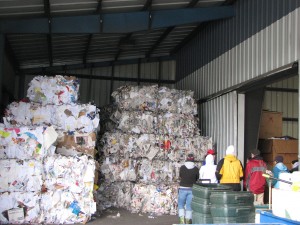One of the world’s greatest tragedies, known by many as Great Pacific garbage patch, is but a small example of the impact that human waste is having on the natural environment. When looking at ways to reduce our impact, the phrase “reduce, reuse, recycle” is commonly used. The order of the words in this phrase should be carefully analyzed, as they are placed to coincide with the way that they should be prioritized. The average amount of municipal solid waste per person per day in the U.S. is 4.4 pounds.[1] This figure has increased dramatically over the last few decades. Well over half of this waste is discarded, with the rest being recycled.
The first and most important word in this phrase, reduce, is one that is seemingly the most difficult for individuals when making lifestyle changes. Simple examples of ways to reduce your consumption include:
- Buy in bulk to reduce unnecessary packaging
- Borrow, rent, or share items that are used infrequently, like party decorations, tools, or furniture
- Maintain and repair products, like clothing, tires, and appliances, so that they won’t have to be thrown out and replaced as frequently.
Reusing can be almost as effective as reducing, as it can still keep materials from entering landfills or recycling centers. The advantage of reusing over recycling is the lack of energy use needed to recycle the product. Below are a few tips on increasing the reuse of materials.
- Buy used. You can find everything from clothes to building materials at specialized reuse centers and consignment shops. Often, used items are less expensive and just as good as new.
- Buy reusable over disposable items. Look for items that can be reused; the little things can add up. For example, you can bring your own silverware and cup to work, rather than using disposable items.
The last of the 3 R’s is the use of recycling. The Palouse region is fortunate to have strong recycling infrastructure in place, and it should be utilized. Moscow,[2] Pullman,[3] and Whitman County[4] all have websites sharing information about this infrastructure.
Footnotes
1. Municipal Solid Waste Generation, Recycling, and Disposal in the United States, United States Environmental Protection Agency
2. Moscow Recycling, City of Moscow, Idaho
2. Pullman Recycling, City of Pullman, Washington
2. Whitman County Recycling, Whitman County, Washington
